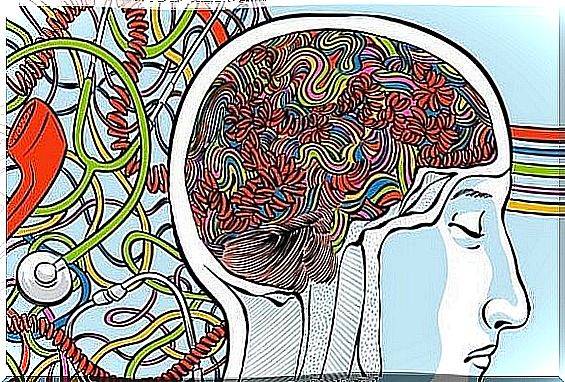The Vagus Nerve Can Reduce Anxiety And Improve The Quality Of Life

The vagus nerve interacts with so many different parts of our body. So much so that many define it as the driving force of the body, an inner channel that regulates rest and also disables signs of anxiety in our body. Knowing how to stimulate it through exercises such as diaphragmatic breathing will undoubtedly help us reduce many of the negative emotions that strike us on a daily basis.
Think for a moment about all the situations that generate anxiety, about everything that gives fear, discomfort, aversion… If we examine these moments, we will see how, at a given time, the stomach or intestines begin to suffer from spasms, cramps and it feels as if there are a hundred angry butterflies fluttering around inside us. This feeling is immediately picked up by the vagus nerve, and it sends a clear message to the brain: “we have a threat”.
Professor Wolfgang Langhans from ETH Zurich and his team discovered a few years ago that this fascinating nerve is closely linked to our emotions, and more specifically to the feeling of fear or desire to escape. For example, they showed that people suffering from chronic anxiety have a hypersensitivity in this nerve. In addition, and this is important to remember, the vagus nerve starts from the cerebellum and delivers to the digestive system, intestinal system, respiratory tract, heart and liver.
Thus, much of the body loses its balance when it falls victim to anxiety: the heart accelerates, digestion becomes heavy and we suffer from diarrhea. One way to regulate the effect of many of our negative emotions is to “activate” the vagus nerve properly. Although the nerve responds automatically to different situations in the body, it is possible to stimulate it or give it a boost to promote a feeling of relaxation.

The vagus nerve: a part of the body that we should all know about
In 1921 , a Nobel Prize-winning German physiologist, Otto Loewi, discovered that stimulation of the vagus nerve had a very interesting effect : the heart rate was reduced and a very special substance was released into the body. He called this substance ” Vagus stuff ” (which translated from German is “vagus substance”). This “vagus substance” was actually a very specific neurotransmitter: acetylcholine , and it was the first neurotransmitter to be identified by researchers.
Acetylcholine is one of the most important chemicals in our body, because it enables the transmission of nerve impulses. The vagus nerve, on the other hand, plays an equally important role: it acts as a driving force in the parasympathetic nervous system , and takes responsibility for regulating our reactions regarding rest, digestion, the need to escape or relax.
It is, in a way, a power game where well-being is at the center of the homeostatic balance.
Clinical psychologists like Kyle Bourassa at the University of Arizona explain that something as basic as favoring a healthy connection of the vagus nerve between the intestines and the brain will help us greatly. For example, it will help our body better regulate the production of neurotransmitters such as acetylcholine and GABA (gamma-aminobutyric acid). In this way, and thanks to these neurotransmitters, we will be able to reduce the heart rate, blood pressure and lower the activity of overactivated organs due to the effect of anxiety. Two of the benefits of this will be better sleep and better digestion.
Now we go deeper into how to start this.
How to stimulate the vagus nerve?
There are some people who can stimulate the vagus nerve thanks to a good physiotherapist who specializes in this area. Through a series of massages in the area at the opening of the stomach, the vagus nerve can be activated to provide a comfortable feeling of calm and thus relieve the intestinal spasms associated with anxiety.
However, there is another method that we can perform on our own. We achieve this through diaphragmatic breathing. It is a good strategy for relaxation, and if you practice it daily, you will also experience fewer feelings of threat, better digestion, better inner balance and a more refreshing rest. There are also many other strategies that, combined with deep or diaphragmatic breathing, can help us:
- Moderate aerobic exercise on a daily basis
- Positive and enriching social connections
- To practice meditation
- To write a diary to get to know ourselves better
- Consumption of probiotics – having a strong, healthy intestinal flora results in better brain health
- A cold shower for a few seconds
- Practicing yoga
- To sleep on the left side
- To laugh often
- To increase our levels of serotonin and oxytocin

In conclusion, as we can see in the list above, there is one aspect that should definitely catch our attention. The simple fact that producing positive emotions, having a good social life, moments of leisure, laughter and relaxation… all stimulate our vagus nerve and have great benefit for our bodies. We should not forget that it is in the intestine itself where between 80 and 90% of serotonin is produced. Serotonin is commonly known as the “wellness hormone”. Nor can we overlook that just having a smile on your face, dancing, walking, swimming… all of these generate very positive metabolic changes. Changes such as the amazing vagus nerve, which connects to so many parts of our body, receive instantly, and send a very specific message to our brain: “Everything is going well, everything is calm!”.









